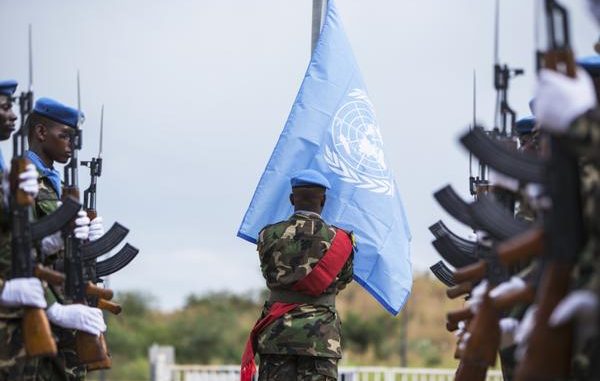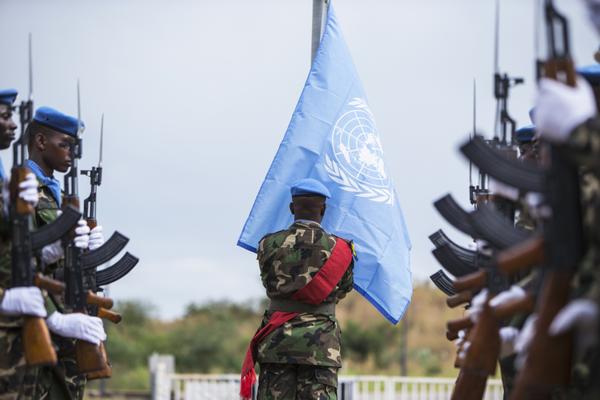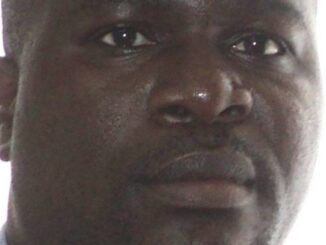
More than 3,300 peacekeepers who have lost their lives while serving under the United Nations flag have been honoured at a wreath laying ceremony in New York.
The ceremony took place on the International Day of United Nations Peacekeepers which is marked on 29 May each year.
The theme for this year is “UN70 and UN Peacekeeping: Past, Present, and Future”.
Derrick Mbatha reports.
The UN Secretary-General said the annual day is a sad occasion on the UN calendar but one which will always be honoured with the greatest possible dignity.
Ban Ki-moon called for the observance of a solemn moment of silence to honour the 126 heroes from 38 countries who died last year while serving under the United Nations flag.
“The deployments are higher – and so are the death tolls. In the first 45 years of the United Nations, there were four years when more than 100 peacekeepers lose their lives. In just the last 14 years, we have suffered that terrible loss already ten times. Last year was the seventh year in a row that more than 100 peacekeepers lost their lives.” (26″)
The Secretary-General said the conditions were especially hazardous in Mali where the UN mission lost over 40 of its personnel.
He also mentioned the Darfur region of Sudan where two dozen peacekeepers were lost and pointed out that in Liberia, for the first time, the UN lost peacekeeping personnel to Ebola.
Derrick Mbatha, United Nations
_______________________________
29 May 2015 – On the International Day of United Nations Peacekeepers, Secretary-General Ban Ki-moon stressed the “invaluable contribution” of peacekeeping to the history of the Organization and reaffirmed his commitment to improving the effectiveness of ‘blue helmets’ in the coming years.
“Since its beginning in 1948, United Nations peacekeeping has evolved into one of the main tools used by the international community to manage complex crises that threaten international peace and security,” said Mr. Ban in message to mark the Day.
“Throughout its history, the United Nations has established a total of 71 peacekeeping operations. More than one million military, police and civilian personnel have served as UN peacekeepers, including 125,000 in the sixteen missions in operation today.”
Through years of struggle and sacrifice, the iconic Blue Helmet has earned its place as a symbol of hope to millions of people living in war-ravaged lands.
The International Day of United Nations Peacekeepers is an occasion to salute the peacekeepers of today who serve in some of the world’s most volatile and dangerous environments. It is commemorated each year on 29 May because that that was the date in1948 when the UN Truce Supervision Organization (UNTSO) – the world’s first peacekeeping mission – began operations in Palestine.
“United Nations peacekeeping has given life to the UN Charter’s aim ‘to unite our strength to maintain international peace and security,’” said Mr. Ban. “Through years of struggle and sacrifice, the iconic Blue Helmet has earned its place as a symbol of hope to millions of people living in war-ravaged lands.”
The message added that the Day exists as a chance to mourn fallen peacekeepers, noting that during its history, more than 3,300 “Blue Helmets” have died devoting their lives to peace, including 126 men and women in 2014.
To mark the Day at UN Headquarters, the Secretary-General participated in a wreath-laying ceremony in the morning, then presided over a ceremony at which the Dag Hammarskjöld Medal was awarded posthumously to the military, police and civilian personnel who lost their lives while serving in peacekeeping operations last year.
At the wreath laying, Mr. Ban and gathered dignitaries observed a solemn moment of silence to honour those who had died in the past year.
“Threats continue. Already this year, 49 peacekeepers have lost their lives,” he said. “The operational environments are getting worse. Our peacekeepers are increasingly exposed to asymmetric threats. They are attacked, targeted and killed by extremists.”
He described particularly hazardous conditions faced by operations in Mali and Darfur, which were responsible for the largest losses of life, and in Liberia, where a peacekeeper was lost to Ebola.
At the presentation of the Dag Hammarskjöld Medal, Mr. Ban said that the 126 peacekeepers killed last year marked a saddening trend, as the danger grew and 2014 entered the books as the seventh in a row in which more than 100 peacekeepers had been killed.
“Of all the ceremonies that the UN organizes, this is perhaps the most solemn and most difficult. But in many ways it is the most inspiring,” he said. “Their sacrifice, and the way that they lived their lives, makes us all proud and spurs us on to work harder to ensure that their lives were not lost in vain.”
Currently, demand for UN peacekeeping operations is at an all-time high. Operations receive contributions of military and police personnel from 122 Member States. This impressive number reflects strong global confidence in the value of United Nations peacekeeping as a tool for collective security.
In a press conference at headquarters, the Under-Secretary-Generals for Peacekeeping and for Field Support also reflected on the service of Blue Helmets who served the UN in the cause of peace in what he described as a “difficult world” but one in which there were extensive efforts to adjust to and rise to the expectations of the international community.
“It’s an opportunity to reflect on the nature of the threats that we face on the ground,” said Mr. Ladsous on the evolution of peacekeeping in the modern world. “More than ever our obligation is to improve performance. We improve on performance by the use of up to date technology.”
He said that did not mean merely the use of high-tech equipment like Unmanned Aerial Vehicles (UAVs) but was about putting a lot more technical means, many of which were available on commercial markets, to improve safety and security.
This idea was echoed by Atul Khare, the Under-Secretary-General for Field Support. He also underlined the need for availability of a wide variety of technology to counter the many “grave and asymmetrical” threats faced by peacekeepers as they discharged their complex mandates and he outlined his priorities for his tenure. They were to improve rapidity and proactivity of support, as well as its effectiveness and the efficiency with which it was delivered.
He said he was “truly humbled” to receive the Dag Hammarskjöld medal on behalf of civilian peacekeepers, and noted that of the 126 peacekeepers who died last year, 19 were civilians, which he noted was a large proportion of the total.
“Today is a day for reflection and gratitude for the service of peacekeepers,” he said. “But today is also a day of introspection, of reflection, on the sacrifices that serve as a stark reminder of the massive challenges that we face on the ground every day.”
Peacekeepers remain dedicated to serve despite growing threats
Peacekeepers serving the UN continue to be dedicated to protecting vulnerable civilians despite growing security threats and often difficult living conditions, according to the Assistant Secretary-General for UN peacekeeping.
Edmond Mulet was speaking ahead of theInternational Day of UN Peacekeepers, marked annually on 29 May.
More than 3300 women and men serving the organization as peacekeepers have lost their lives since the UN’s first operation in 1948.
Stephanie Coutrix began by asking Mr Mulet about the importance of having an international day dedicated to them.
Duration: 4’13”
Remarks at Dag Hammarskjöld Medal Ceremony marking the International Day of United Nations Peacekeepers
Secretary-General Ban Ki-moon, UN Headquarters, 29 May 2015
I am honoured to be here today on this solemn occasion.
Today, we posthumously award the Dag Hammarskjöld medal to 126 peacekeepers from 38 countries who died last year while serving under the United Nations flag.
I regret to say this is the seventh year in a row that more than 100 peacekeepers lost their lives. The risks that our peacekeepers face are growing steadily – from attacks by extremists and rebel groups to the threat of diseases, including Ebola.
Of all the ceremonies that the UN organizes, this is perhaps the most solemn and most difficult. But in many ways it is the most inspiring. The peacekeeping community gathers together to honour courageous men and women who lost their lives while defending the most vulnerable people in some of the most dangerous places on earth. Their sacrifice, and the way that they lived their lives, makes us all proud and spurs us on to work harder to ensure that their lives were not lost in vain.
UN Peacekeeping will continue to carry risks and sadly this will not be the last time we gather together to mourn. Our peacekeepers carry a heavy burden for all of us.
But their hard work and successes have made UN peacekeeping an irreplaceable tool for the international community to address countries in conflict and to help the millions of people affected by war. The fact that 125,000 peacekeepers serve today, an all-time high, is a true testament to the faith and confidence entrusted in them.
Among those honoured today are peacekeepers who lost their lives in Afghanistan, the Central African Republic, Cote d’Ivoire, Cyprus, the Democratic Republic of the Congo, Haiti, Mali, the Middle East, Liberia, Sudan and South Sudan.
41 of the peacekeepers honoured here today lost their lives in Mali, 28 due to acts of violence. We may be gathered in New York, but our thoughts are with our colleagues still deployed around the world.
When many people think of peacekeepers they often think of our heroic “blue-helmeted” military personnel. But those we honour today were also police officers, medical personnel, public affairs officers and national staff. They all played their own special role in our multi-dimensional peacekeeping operations which not only try to keep peace, but to also build it so that the countries don’t relapse into conflict.
Today, I offer my highest tribute to those we honour, and my sincerest condolences to their loved ones.
The medal bestowed today is named after Secretary-General Dag Hammarskjöld, who was a true champion of peace and, like those we honour here today, gave his life for it. Let us honour his memory and theirs by working to ensure that the United Nations becomes an even more effective institution in bringing peace, security and prosperity to the peoples of the world.
Thank you.
Remarks at Wreath-Laying Ceremony for International Day of United Nations Peacekeepers
Secretary-General Ban Ki-moon, UN Headquarters, 29 May 2015
Thank you for attending this commemoration. This is a sad occasion on our UN calendar – but one we will always honour with the greatest possible dignity.
It is appropriate that we meet at this UN Peacekeeping memorial site, which pays eternal tribute to our fallen colleagues.
Let us now observe a solemn moment of silence to honour the 126 heroes from 38 countries who died while serving under the United Nations flag in 2014 – and to remember the 3,366 who have lost their lives in the history of UN peacekeeping.
[OBSERVED MOMENT OF SILENCE]
Thank you.
This is a time of danger and growth for our United Nations blue helmets.
We now have more peacekeeping personnel serving than ever before, with more than 125,000 in the field.
The deployments are higher – and so are the death tolls.
In the first 45 years of the United Nations, there were four years when more than 100 peacekeepers lose their lives. In just the last 14 years, we have suffered that terrible loss already ten times.
Last year was the seventh year in a row that more than 100 peacekeepers lost their lives.
The conditions were especially hazardous in Mali. Our Mission there lost 28 of their colleagues due to malicious acts and 41 overall. This is one of the highest one-year fatality rates for any peacekeeping operation in UN history.
Also last year, in Darfur, two dozen peacekeepers lost their lives. Three of them, from Ethiopia, were senselessly killed while protecting a water pump that was used by internally displaced persons and students from a nearby school.
In Liberia, for the first time we lost peacekeeping personnel to Ebola.
Elsewhere in Africa, the Middle East, Haiti and beyond, men and women from UN peacekeeping succumbed to deadly diseases, accidents and acts of violence. These dangers are all too prevalent in the course of their life-saving work.
The threats continue. Already this year, 49 peacekeepers have lost their lives.
The operational environments are getting worse. Our peacekeepers are increasingly exposed to asymmetric threats. They are attacked, targeted and killed by extremists.
I take these dangers very seriously. That is why I have been doing everything possible to adapt our operations to these more dangerous environments. We need new capabilities. We cannot do 21st century peacekeeping with 20th century tools.
Our experts are taking steps to provide better safety and security. We have started deploying more armoured vehicles. We are enhancing security at our facilities. We are utilizing new technology to carry out work which would be more dangerous if it had to be done by peacekeepers.
UN MEDIA





